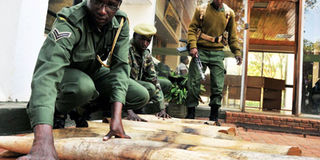Lobby groups unveil new tool to fight poaching in game reserves

PHOTO | AFP Kenya Wildlife Services rangers move impounded ivory in Nairobi in February. Conservationists launched a new technology to curb poaching in game reserves on March 25, 2013.
What you need to know:
- Technology designed to help rangers work with communities living around parks and forests to fight illegal ivory trade
Conservationists on Monday unveiled new technology to curb poaching in wildlife sanctuaries.
The software dubbed Spatial Monitoring and Reporting Tool (SMART 1.0) is designed to help rangers who will work with communities living around game reserves and forests to fight poachers.
Mr Benson Okita-Ouma, Kenya Wildlife Service senior scientist attached to the Rhino Programme, said the open source software SMART would help rangers to monitor and evaluate law enforcement efforts.
Last year, 25,000 elephants across the world were killed as the demand for ivory especially in the Far East outstripped ‘supply’.
The trade, which is illegal in Kenya, has seen insecurity in source countries with cartels providing guns and high-tech communication equipment to facilitate poaching.
The fight against poaching nearly suffered a major blow when some ivory-market countries vouched for one-off sale of impounded consignments of game trophies.
The proposal was, however, rejected and a committee formed to monitor ivory trade with a decision set to be made later.
SMART enables rangers and managers to measure, evaluate and improve the effectiveness of wildlife law enforcement patrols and site-based conservation activities.
SMART was developed through a partnership of conservation organisations such as CITES-MIKE, the Frankfurt Zoological Society, the North Carolina Zoo, Wildlife Conservation Society, World Wildlife Fund and the Zoological Society of London.
The lobby groups said they formulated a new way to fight poaching because traditional approaches had failed to stem illegal killing of tigers, rhinos, elephants, great apes and marine turtles.
“This vital tool will help the eco-guards on the frontlines of conservation get out ahead of the poachers and protect the most iconic species on our planet. Without SMART, the poachers will remain more sophisticated, which we cannot let happen,” said Wild World Fund’s Asian Species expert Barney Long.
At the same time, the Kenya Wildlife Service has raised alarm over influx of guns in ranches bordering parks in Taita Taveta.
Tsavo Conservation Area senior assistant Julius Kimani said crooks were taking advantage of the influx of camel herders into Tsavo East National Park to sneak in fire arms.
Since the ranch owners began to lease their land to herders, poaching of elephants and rhinos in the had increased, said Mr Kimani.
“It is worth noting that where there are camels, there are also fire arms and this should not be taken lightly,” he said.
Last week, the KWS deployed a special security team to the region to curb poaching outside the protected areas.




